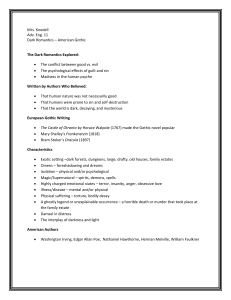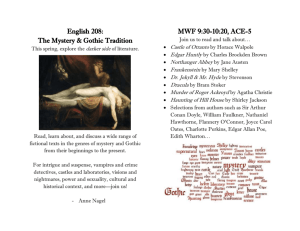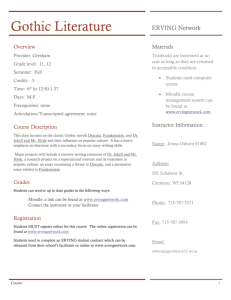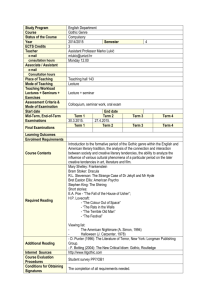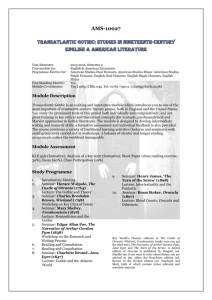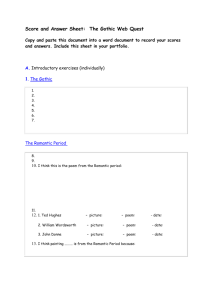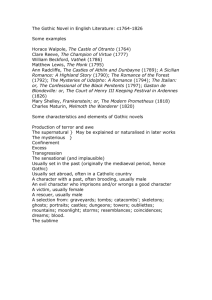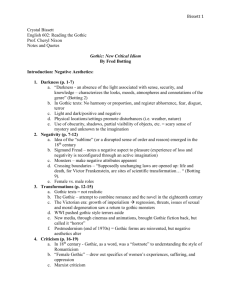Eng 219 Gothic
advertisement
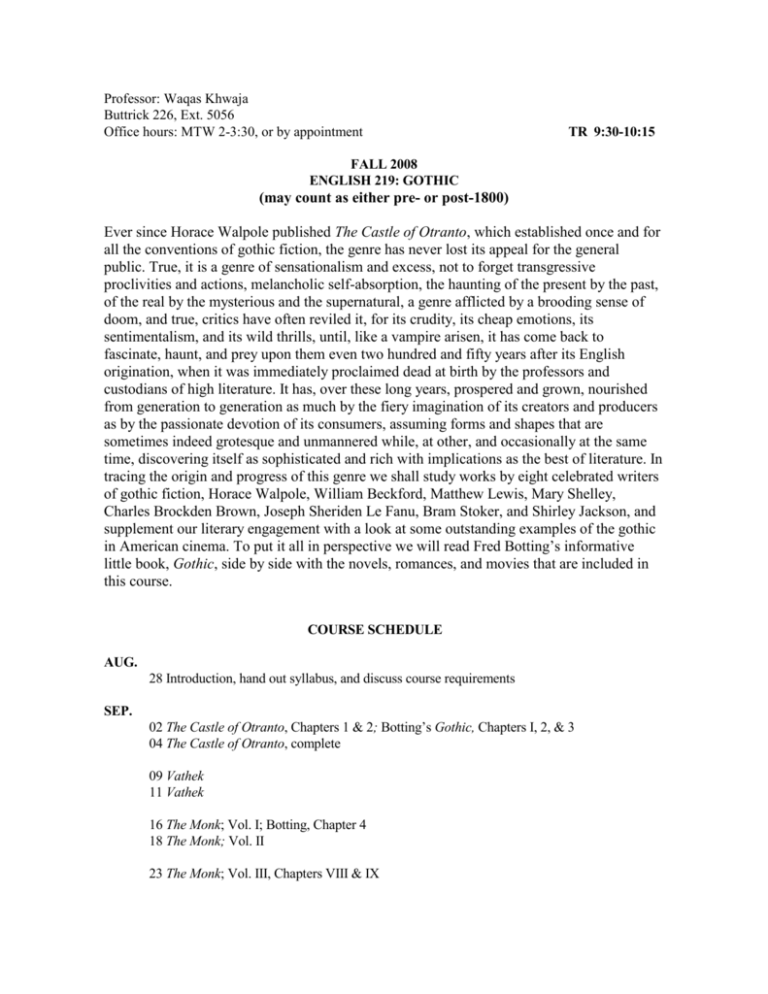
Professor: Waqas Khwaja Buttrick 226, Ext. 5056 Office hours: MTW 2-3:30, or by appointment TR 9:30-10:15 FALL 2008 ENGLISH 219: GOTHIC (may count as either pre- or post-1800) Ever since Horace Walpole published The Castle of Otranto, which established once and for all the conventions of gothic fiction, the genre has never lost its appeal for the general public. True, it is a genre of sensationalism and excess, not to forget transgressive proclivities and actions, melancholic self-absorption, the haunting of the present by the past, of the real by the mysterious and the supernatural, a genre afflicted by a brooding sense of doom, and true, critics have often reviled it, for its crudity, its cheap emotions, its sentimentalism, and its wild thrills, until, like a vampire arisen, it has come back to fascinate, haunt, and prey upon them even two hundred and fifty years after its English origination, when it was immediately proclaimed dead at birth by the professors and custodians of high literature. It has, over these long years, prospered and grown, nourished from generation to generation as much by the fiery imagination of its creators and producers as by the passionate devotion of its consumers, assuming forms and shapes that are sometimes indeed grotesque and unmannered while, at other, and occasionally at the same time, discovering itself as sophisticated and rich with implications as the best of literature. In tracing the origin and progress of this genre we shall study works by eight celebrated writers of gothic fiction, Horace Walpole, William Beckford, Matthew Lewis, Mary Shelley, Charles Brockden Brown, Joseph Sheriden Le Fanu, Bram Stoker, and Shirley Jackson, and supplement our literary engagement with a look at some outstanding examples of the gothic in American cinema. To put it all in perspective we will read Fred Botting’s informative little book, Gothic, side by side with the novels, romances, and movies that are included in this course. COURSE SCHEDULE AUG. 28 Introduction, hand out syllabus, and discuss course requirements SEP. 02 The Castle of Otranto, Chapters 1 & 2; Botting’s Gothic, Chapters I, 2, & 3 04 The Castle of Otranto, complete 09 Vathek 11 Vathek 16 The Monk; Vol. I; Botting, Chapter 4 18 The Monk; Vol. II 23 The Monk; Vol. III, Chapters VIII & IX 25 The Monk, complete 30 Frankenstein; Botting, Chapter 5 OCT. 02 Frankenstein 07 Mary Shelley’s Frankenstein; first five-page, thesis-driven, analytical paper due 09 Wieland, Chapters I-V; Botting, Chapter 6 14 Wieland, complete FALL BREAK, OCT. 16-19 21 Uncle Silas 23 Uncle Silas 28 Uncle Silas 30 Botting, Chapter 7 NOV. 04 Dracula, Chapters I-V 06 Dracula 11 Dracula, Complete 13 Bram Stoker’s Dracula; second five-page, thesis-driven, analytical paper due 18 The Haunting of Hill House; Botting, Chapter 8 20 The Haunting of Hill House 25 The Haunting THANKSGIVING, NOV. 26-30 DEC. 02 Psycho 04 Summing up; 10-page, thesis-driven, analytical research paper due *Fred Botting’s Gothic should be regularly used to prepare yourself with background information on topics and/or texts being discussed in the classroom. TEXTS: William Beckford. Vathek. Penguin. 1995. Fred Botting. Gothic. Routledge. 1996. Charles Brockden Brown. Wieland. Modern Library. 2002. Shirley Jackson. The Haunting of Hill House. Penguin. 2006. Joseph Seridan Le Fanu. Uncle Silas. Penguin. 2001. Mary Shelley. Frankenstein. Bedford/St. Martin’s. 2000. Matthew Lewis. The Monk. Penguin. 1999. Horace Walpole. The Castle of Otranto. OUP. 1998. Bram Stoker. Dracula. Bedford/St. Martin’s. 2001. MOVIES: Psycho (Alfred Hitchcock) Bram Stoker’s Dracula (Francis Coppola) The Haunting Beloved (Jonathan Demme) Frankenstein ASSIGNMENTS: ALL WORK TURNED IN SHOULD BE TYPED OR PRINTED ON A COMPUTER LETTER-QUALITY PRINTER. IT SHOULD BE DOUBLE-SPACED AND PROPERLY PROOFREAD FOR TYPOGRAPHICAL AND SPELLING ERRORS BEFORE IT IS SUBMITTED FOR EVALUATION. LAST MINUTE CORRECTIONS OF MINOR SPELLING MISTAKES OR PUNCTUATION ERRORS MAY BE MADE BY HAND. BE SURE TO FOLLOW THE CONVENTIONS OF THE MLA STYLESHEET AS DESCRIBED IN YOUR HANDBOOK. ALL STUDENTS MUST OBTAIN THE APPROVAL OF THE PROFESSOR FOR THE TOPICS OF THEIR RESEARCH PAPERS AND PRESENTATIONS. CLASS PARTICIPATION: YOU ARE EXPECTED NOT ONLY TO ATTEND YOUR CLASSES REGULARLY BUT TO GENERATE AND ACTIVELY PARTICIPATE IN CLASS DISCUSSIONS. YOUR COMMENTS SHOULD INDICATE THAT YOU HAVE READ OR, IN THE CASE OF MOVIES, VIEWED THE ASSIGNED MATERIAL AND REFLECTED UPON IT ENOUGH TO WARRANT THE POSITIONS YOU TAKE AND THE OPINIONS YOU OFFER. BRING IN A TYPED (OR PRINTER GENERATED) LIST OF 5-6 DISCUSSION POINTS OR QUESTIONS FOR EACH CLASS DAY. THESE SHOULD BE USED TO INITIATE DISCUSSION AND ARE TO BE TURNED IN, UNDER YOUR NAME, AT THE END OF EACH CLASS PERIOD. GROUP PRESENTATIONS: THESE ARE PROJECTS FOR WHICH THE CLASS WILL DIVIDE INTO GROUPS OF THREE STUDENTS EACH FOR RESEARCH AND ANALYSIS OF SPECIFIC ASPECTS OF A SELECTED TEXT OR MOVIE. EACH GROUP WILL PRODUCE A SIXPAGE BRIEF (TWO PAGES TO EACH PARTICIPANT) THAT SHOULD INCLUDE: (A) A CLEAR DEMARCATION OF THE AREA OF RESEARCH, INVESTIGATION, AND ANALYSIS ALONG WITH THE MAIN IDEA, THESIS, OR OBJECTIVE OF THE PRESENTATION; (B) A RESUMÉ OF SOURCES CONSULTED, TAKING CARE TO DISTINGUISH BETWEEN PRIMARY AND SECONDARY SOURCES; (C) THE INFORMATION GATHERED, PROPERLY ORGANIZED IN THEMATIC CATEGORIES AND SECTIONS; (D) AN EXPLANATION OF THE MANNER IN WHICH YOUR SCHOLARLY INVESTIGATION AND ANALYSIS HELPS TO PROVIDE A BETTER UNDERSTANDING OF THE WORK; AND (E) SUGGESTIONS ABOUT FURTHER RESEARCH ON THE SUBJECT. FINDINGS SHALL BE PRESENTED IN A TWENTY-MINUTE REPORT TO THE CLASS AND BE SUPPLEMENTED WITH AN ANALYSIS OF THEMES, CHARACTERS, NARRATIVE MODES AND/OR STRATEGIES OF REPRESENTATION. PRESENTATIONS WILL BE FOLLOWED BY A QUESTION AND ANSWER SESSION. THE WORK OF EACH GROUP MEMBER SHOULD BE CLEARLY REFLECTED IN THE BRIEF AND THE PRESENTATION. POSSIBLE AREAS OF RESEARCH INCLUDE, BUT ARE NOT LIMITED TO GENDER DYNAMICS AND ISSUES OF POWERPLAY, CULTURAL CONFLICTS AND CONTRADICTIONS, RELATIONSHIPS OF DOMINANCE AND SUBSERVIENCE, DESIRE AND SEXUALITY, TRANSGRESSIVE ACTS AND IMPULSES, THE NATURE OF GOOD AND EVIL, GUILT, ANXIETY, AND DESPAIR, SOCIAL REVERBERATIONS OF RACE, CLASS, AND ETHNICITY, THE PSYCHOLOGY OF TERROR, EARLY RECEPTION (REVIEWS) OF THE TEXT OR MOVIE, CURRENT CRITICAL OPINION ON THE WORK, BIOGRAPHICAL BACKGROUND OF THE AUTHOR OR DIRECTOR AND ITS RELEVANCE TO THE ANALYTICAL PROCESS, POLITICAL UNDERTONES, HISTORICAL CONTEXT, ETC. CONSIDER CREATIVE AND INNOVATIVE WAYS OF TREATING YOUR SUBJECT. DRAMATIZATION OR VISUAL REPRESENTATION MAY HELP, BUT YOU ARE ENCOURAGED TO EMPLOY ANY METHODS OR STRATEGIES THAT MAY APPEAL TO YOU AS LONG AS YOU MAKE YOUR POINT CLEARLY AND RETAIN THE INTEREST OF YOUR AUDIENCE. TURN IN YOUR WRITTEN ASSIGNMENTS IN FOLDERS, AND KEEP A FULL DUPLICATE RECORD OF YOUR WORK WITH YOU AS A RULE. LATE PAPERS, ATTENDANCE, PUNCTUALITY: THE COLLEGE POLICIES PRESCRIBE PENALIZATION FOR ASSIGNMENTS COMPLETED AFTER THE DUE DATE. A THIRD OF A LETTER GRADE WILL BE DEDUCTED FOR EACH ADDITIONAL DAY TAKEN FOR COMPLETING THE ASSIGNMENT. AN EXTENSION MAY BE GRANTED ONLY UNDER EXCEPTIONAL CIRCUMSTANCES. CLASS ATTENDANCE IS MANDATORY AS IS PUNCTUALITY. THIS IS EXPECTED OF ALL OF YOU. BUT SIX MISSED CLASSES WITHOUT COMPELLING CAUSE OR PRIOR PERMISSION FROM YOUR PROFESSOR WILL RESULT IN "F" FOR THE COURSE. FIVE PERCENTAGE POINTS WILL BE DEDUCTED FOR EACH UNAUTHORIZED ABSENCE, THREE POINTS FOR HABITUAL TARDINESS. JOINING THE CLASS LATER THAN FIVE MINUTES AFTER THE SCHEDULED TIME MORE THAN THREE TIMES DURING THE SEMESTER WILL BE CONSIDERED "HABITUAL TARDINESS." THE DEPARTMENT OF ENGLISH REQUIRES THAT ALL ASSIGNMENTS MUST BE COMPLETED IF A STUDENT IS TO RECEIVE CREDIT FOR THE COURSE. GRADES: THE FINAL GRADE SHALL BE CALCULATED IN THE FOLLOWING MANNER: 1) CLASS PARTICIPATION, INCLUDING DISCUSSION POINTS, 15%; 2) GROUP PRESENTATION, 15%; 3) PRESENTATION BRIEF, 15%; 4) TWO 5-PAGE ANALYTICAL PAPERS, 30%; 5) 8-10-PAGE RESEARCH PAPER, 25%. Your professor reserves the right to make amendments and modifications to this syllabus.
